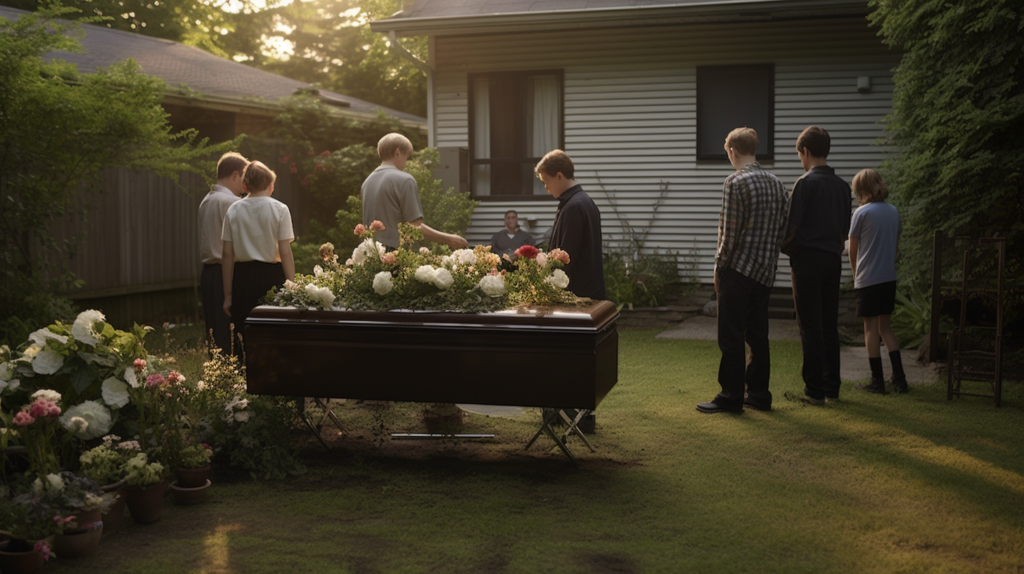Key Takeaways
- Humanist funerals are non-religious ceremonies that celebrate the life and legacy of the deceased
- These services are highly customizable and led by a celebrant to best reflect the individual’s values and wishes
- Components of a humanist funeral may include eulogies, readings, poetry, and music specific to the person being honored
Humanist funeral celebrations are specifically tailored to honor the unique personality and achievements of the person who has passed away, allowing friends and family to remember their loved one and express their grief in a meaningful way.
Humanist funerals are led by a celebrant, who helps create a customized service that reflects the values and preferences of both the deceased and their family.
This article about humanist funerals is part of a bigger funeral planning series; if you’re considering pre-planning your funeral, or have the immediate need to plan a funeral service for a loved one, we encourage you to read our intro guide on how to plan a funeral.
These services often include eulogies, readings, poetry, and music, all of which are chosen to resonate with the life and legacy of the person being celebrated.
At its core, a humanist funeral is a heartfelt and dignified way to say goodbye and pay tribute to someone’s life without the constraints of traditional religious customs.
In this guide about humanist funerals:
What is a Humanist Funeral?
A humanist funeral is a non-religious and personal funeral ceremony that focuses on celebrating the life of the deceased without mentioning a religion or god. As you attend a humanist funeral, you’ll experience a dignified farewell, highlighting the life and legacy of your loved one.
Humanism is a philosophy that values human nature and innate morality over religious ideology. This belief system translates into humanist funerals embracing highly individualized ceremonies. You might find these ceremonies similar to traditional funeral services, but they exclude sacred iconography and worship of any kind.
In a humanist funeral, readings and music are common elements of the service, chosen to reflect the life, values, and personality of the deceased. Eulogies and speeches by family members or friends also form an essential part of the event, as they help to honor and remember the person who has passed away. However, unlike religious funerals, prayers or references to an afterlife are omitted, centering the focus on the unique life that your loved one lived.
Professional celebrants lead non-religious funeral services and work closely with family members to ensure that the ceremony captures the essence of the deceased’s life. These celebrants guide guests through the various readings, music, and other elements of the service, creating a supportive and meaningful space for everyone involved.
When planning or attending a humanist funeral, remember that the primary goal is to celebrate the life of the individual who has passed away while giving you and other attendees an opportunity to express your grief and say your final goodbyes.
Humanist Funeral vs. Religious Funeral
A humanist funeral is a non-religious ceremony that celebrates a person’s life and legacy. Unlike a religious funeral, there is no mention of a god, faith, or an afterlife. These ceremonies focus on the life the person has led, their accomplishments, and the relationships they have forged. A humanist celebrant often leads the service, guiding guests through readings and music suitable for the occasion.
In contrast, a religious funeral is centered around the beliefs, worship, and prayers specific to a particular faith. These ceremonies often take place in a church or other religious setting and may involve various rituals that represent the deceased’s spirituality or connection to a higher power. Prayers and scripture readings are typically included, reflecting the faith’s teachings and offering comfort regarding an afterlife.
The main difference between a humanist funeral and a religious funeral lies in the beliefs and values that guide each ceremony. While a humanist funeral embraces science, compassion, and individual dignity, a religious funeral focuses on a connection to a higher power, such as God.
It is essential for you to respect the wishes of the deceased and their family when planning a funeral service. If you are unsure whether a humanist or religious funeral is most appropriate, consultation with loved ones can help clarify their preferences and ensure the ceremony best reflects the individual’s life and values.
Components of a Humanist Funeral Service
As you plan a humanist funeral, you’ll find it is centered around the person who has passed away, highlighting their unique qualities, experiences, and the impact they had on others.
In a humanist funeral service, the main component is the tribute or eulogy. This is a speech given by a celebrant, typically a humanist celebrant, who will share personal stories and memories of the deceased person. The celebrant may also provide some context about their life, accomplishments, and the relationships they had formed. You are free to choose the most suitable celebrant for your service, whether it’s a family member, a friend, or a professional humanist celebrant.
Readings are another significant aspect of a humanist funeral service. Non-religious readings such as poems, excerpts from books, or personal accounts of memories can be included in the ceremony. These selections should reflect the personality and interests of the deceased, as well as provide comfort, support and inspiration to the attendees. You can choose multiple readings, and ask different people to deliver them, ensuring a diverse representation of voices and memories.
Music also plays an essential role in humanist funerals services. Songs that were meaningful to the deceased or their family can be incorporated, with non-religious songs being the preferred choice. Selecting music that conveys the essence of the person who has died, or that reflects their taste, can help create a more personal and meaningful experience for everyone present.
Throughout the service, the focus remains on the individual and their personal journey rather than on religious beliefs or doctrines. A humanist funeral service aims to provide a warm, sincere, and fitting tribute to the loved one, honoring their memory and their impact on the lives of others.
Remember that the tone of a humanist funeral service should be confident, knowledgeable, neutral, and clear. By incorporating these components in your service, you can create a memorable and heartfelt celebration of the life lived and the positive impact your loved one had on others.
Planning a Humanist Funeral
Tone, Emotion, and Philosophy
When planning a humanist funeral for your loved one, it’s essential to set a tone that emphasizes the deceased’s life, legacy, and the relationships they forged. Remember, humanist funerals are non-religious and focus on individual dignity and human compassion. Make sure to consult with family members to gather ideas and preferences for the ceremony, ensuring that you keep the proceedings genuine and true to the deceased’s values.
Ceremony Locations
Selecting an appropriate location is an important aspect of planning a humanist funeral. You have plenty of options since humanist funerals are not restricted to places of worship. Popular choices include crematoriums, community halls, or natural settings like parks or gardens. The chosen location should reflect the personality and interests of the deceased.
Popular Humanist Funeral Readings and Music
Include readings and music that hold personal significance to your loved one and their family. Humanist funeral readings and music typically steer clear of religious references, instead focusing on poetry, prose, or lyrics that celebrate life, evoke emotions, or offer messages of hope and comfort. Involve close friends or family members in these aspects, encouraging them to share their talents or contribute their favorite pieces to the order of service.
Cost and Duration of a Humanist Funeral
The cost of a humanist funeral will vary based on factors such as the venue, funeral director fees, and additional services (e.g. catering, audio equipment). It’s generally comparable to the cost of traditional religious funerals. Consult with a funeral director to understand the pricing and options that best suit your budget and requirements.
Humanist funerals often last between 30 minutes to an hour, depending on the number of readings, eulogies, and musical performances. Work with your chosen celebrant to develop an order of service that flows smoothly while covering all essential elements, giving enough time for reflection and celebration of your loved one’s life.
Frequently Asked Questions
How do humanist funerals differ from traditional ones?
Humanist funerals are non-religious and focus on the celebration of the deceased’s life, instead of religious rituals or beliefs. Traditionally, funerals are guided by cultural or religious beliefs and may include prayers, hymns, or other religious practices. As a humanist ceremony, the emphasis is on personalization and honoring the memories and accomplishments of the individual being remembered.
What can one expect in a humanist funeral ceremony?
In a humanist funeral ceremony, you can expect a personal and unique service led by a celebrant. The celebration will acknowledge the sadness of loss and emphasize the positive aspects of the person’s life. The service may include readings, eulogies, and music chosen by the family to reflect the loved one’s character, beliefs, and preferences.
What types of readings and music are appropriate for a humanist funeral?
For a humanist funeral, any readings or music that hold personal significance to the deceased and their family can be appropriate. This may include poems, quotes, or passages from favorite books or speeches, and music that had meaning to the person. There are no restrictions as long as the selections are consistent with the non-religious and personal nature of the ceremony.
What attire is appropriate for a humanist funeral?
The attire for a humanist funeral will largely depend on the wishes of the deceased and their family. While more traditional funerals may have specific dress codes, humanist ceremonies often allow for a more relaxed approach. It is best to consult with the family or the celebrant for guidance on appropriate attire, which may range from formal to casual, or even themed depending on the individual’s preferences.
Are humanist funerals more affordable than other types?
The cost of a humanist funeral can vary depending on factors such as the chosen celebrant, location, and any additional services or elements. Generally, humanist funerals can be more affordable since they do not require specific religious venues or officiants. However, it is essential to consider the individual circumstances and services involved when comparing funeral costs.
Where can humanist funerals be held?
Humanist funerals can be held in various locations based on the preferences of the deceased and their family. These may include funeral homes, crematorium chapels, outdoor venues, or any meaningful location that allows for the gathering of friends and family. The primary consideration is choosing a space that reflects the deceased’s personality and wishes while accommodating the guests for the ceremony.


